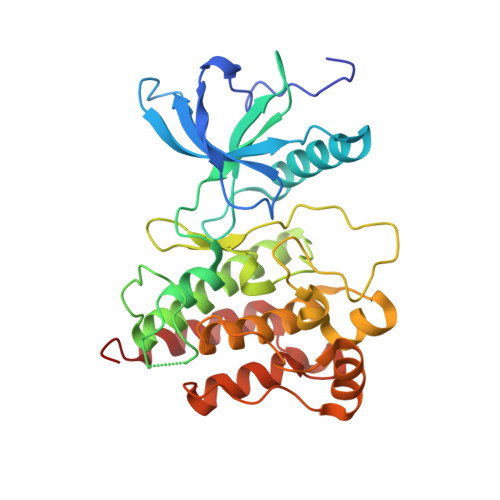Design, synthesis and biological evaluation of 5-amino-1H-pyrazole-4-carboxamide derivatives as pan-FGFR covalent inhibitors.
Deng, W., Chen, X., Liang, H., Song, X., Xiang, S., Guo, J., Tu, Z., Zhou, Y., Chen, Y., Lu, X.(2024) Eur J Med Chem 275: 116558-116558
- PubMed: 38870833
- DOI: https://doi.org/10.1016/j.ejmech.2024.116558
- Primary Citation of Related Structures:
8XZ7, 8Y22 - PubMed Abstract:
The aberrant activation of FGFRs plays a critical role in various cancers, leading to the development of several FGFR inhibitors in clinic. However, the emergence of drug resistance, primarily due to gatekeeper mutations in FGFRs, has limited their clinical efficacy. To address the unmet medical need, a series of 5-amino-1H-pyrazole-4-carboxamide derivatives were designed and synthesized as novel pan-FGFR covalent inhibitors targeting both wild-type and the gatekeeper mutants. The representative compound 10h demonstrated nanomolar activities against FGFR1, FGFR2, FGFR3 and FGFR2 V564F gatekeeper mutant in biochemical assays (IC 50 = 46, 41, 99, and 62 nM). Moreover, 10h also strongly suppressed the proliferation of NCI-H520 lung cancer cells, SNU-16 and KATO III gastric cancer cells with IC 50 values of 19, 59, and 73 nM, respectively. Further X-ray co-crystal structure revealed that 10h irreversibly binds to FGFR1. The study provides a new promising point for anticancer drug development medicated by FGFRs.
Organizational Affiliation:
State Key Laboratory of Bioactive Molecules and Druggability Assessment, International Cooperative Laboratory of Traditional Chinese Medicine Modernization and Innovative Drug Discovery of Chinese Ministry of Education (MOE), School of Pharmacy, Jinan University, #855 Xingye Avenue, Guangzhou, 510632, China.
















